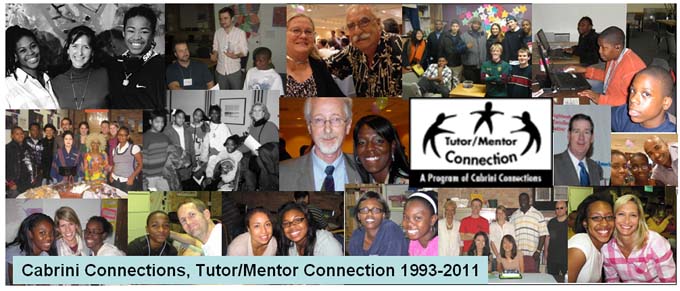Debategraph connected recently with Dan Bassill, founder and president of the Tutor/Mentor Institute LLC and the Tutor/Mentor Connection.
Dan has been working with inner-city youth in Chicago for more than 36 years and also had a 17 year career in corporate advertising with the historic Montgomery Ward Corporation.
Drawing on his advertising experience, Dan began to address the challenge of helping kids in poverty from a business innovation and marketing perspective, rather than social work or youth education perspective.
In the guest blog below, Dan reflects on some of the lessons learned and challenges ahead, and invites you add your voice to the conversation on the Helping kids born in poverty start jobs and careers Debategraph:
I believe that there are four concurrent strategies that could be applied in every major city in the world as part of a set of collective on-going actions to help reduce the costs of poverty in each city.
(1) Knowledge aggregation and visualization: The Tutor/Mentor Institute has been collecting information since 1993, showing where volunteer-based tutor/mentor programs are needed, why they are needed, what different programs do, and why business, philanthropy and others should support the growth of such programs as a strategy for expanding social capital surrounding youth in high poverty neighborhoods of large cities like Chicago, New York, and London. Aggregating and sharing the accumulated knowledge and insights can help the whole community to make faster and more effective progress – and save people from having to “reinvent the wheel” each time a new initiative starts. Using interactive sites like Debategraph, new ideas can be added to the library on an on-going basis, and embedded on the websites of any stakeholder organization around the world – allowing others to discover and build on innovative local solutions to poverty, poorly performing schools, drop out programs and workforce development that have already been implemented elsewhere.
The Tutor/Mentor Institute has also been experimenting with interactive geographical maps that can be used to locate tutor/mentor programs in specific parts of Chicago, and to determine the level of program availability in all parts of the city; making it easy for parents, volunteers and donors, as well as corporate leaders, city planners, marketers and policy makers to connect with the programs.
(2) Increasing public awareness: getting information is just the first challenge, getting millions of people to look at this information and use it in their own actions, is a bigger challenge. While I was working at Montgomery Ward our weekly ads drew shoppers to more than 400 stores, across 40 US states. Since no non-profit has the type of advertising budgets that large corporations have, we have to find creative and engaging ways to draw attention to tutoring/mentoring and the information hosted by the Tutor/Mentor Institute and others. One strategy for creating public awareness has been to organize events such as Tutor/Mentor Leadership and Networking Conferences, held every May and November since 1994. Such events draw 100-150 leaders and stakeholders together in Chicago but create much larger visibility during the months building up to the event. Forums like Debategraph enable the Tutor/Mentor Connection to connect its ideas to people in cities all over the world and to build on the contacts and dialogue between the conferences.
(3) Creating learning circles. Facilitating understanding: The amount of information is overwhelming. That’s an obstacle that can be overcome if volunteers are recruited to help others navigate and learn to use the resources of the library. The Tutor/Mentor Institute focuses on structured, volunteer-based tutor/mentor programs as a core part of its strategy because of the way such programs connect volunteers from the business community and who live beyond poverty with youth who do live in poverty. An organized tutor/mentor program can be a collective effort of many extra people working to help kids grow up. As volunteers stay with youth for one or more years many begin to bond and take on roles similar to “surrogate parents”. Such people become advocates and do much more to help the kids, and the tutor/mentor programs they are part of. Over time such people can become full-time advocates for expanded strategies to help poor kids to careers.
As we aggregate more and more information and increase the number of people who engage with the Tutor/Mentor Institute web sites, there also needs to be a process of facilitation, where people who know more about the information available in the knowledge base help others find and understand the information. In Chicago Interns have been writing blog articles and creating visualizations to help build understanding of this information. If you would be interested in volunteering as intern or discussion leader online, please let me know.

(4) Accelerating the flow of resources: The first three steps create a positive feedback loop as more people begin to use their time, talent and resources to support one or more tutor/mentor programs and, in turn, draw more people and resources into the movement in cities around the world. The information we share can be used by anyone, and the way we innovate public awareness strategies to motivate people to look at this information regularly, and to motivate people to act as volunteers and donors, can sustain this effort for many years into the future.
This not something that was created by the Mayor, the President or funded by a massive government or private foundation grant. The ideas in the Tutor/Mentor Institute were developed over a period of 35 years in response to what we learned as we struggled each year to find resources to operate one single small tutor/mentor program in Chicago. We have demonstrated the potential of the Internet, where people who “don’t have power, don’t have celebrity standing, and are not the elected leaders of a region can put their own ideas for building a better world on the Internet and invite others to join with them in making those ideas a reality.
It’s an idea in tune with our times: and if the idea of helping kids in poverty find work appeals to you, you are welcome to join us.



